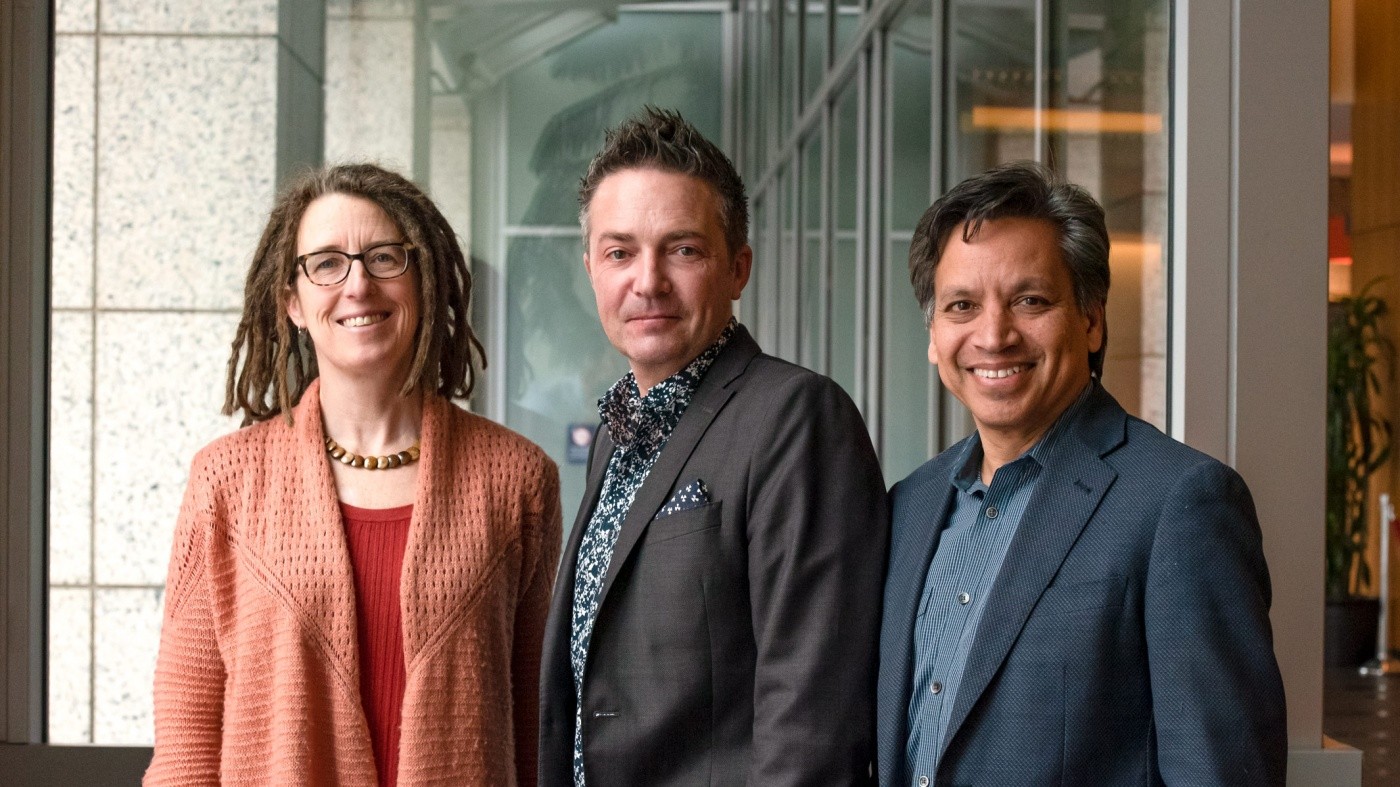Gladstone NOW: The Campaign Join Us on the Journey✕

Gladstone Senior Investigators Katie Pollard (left), Benoit Bruneau (center), and Deepak Srivastava (right) will share funding from Additional Ventures to study a heart anomaly known as single ventricle defect.
Gladstone Institutes announced today that it is the recipient of a $1.2 million Innovation Fund, endowed by the nonprofit foundation Additional Ventures. In receiving this funding, Gladstone joins four other research institutions in a large-scale coordinated research effort centered on identifying new avenues to treat patients with single ventricle heart defects (SVDs).
“Forty years ago, children with single ventricle heart defects didn’t survive past infancy,” said Erin Hoffmann, Additional Ventures president and cofounder. “While surgical advancements have vastly improved the chance of survival for these children, it also means that we must now focus on high-impact research to provide new treatment options that allow them to live long, normal lives.”
Single ventricle heart defects are rare, affecting about 5 in 100,000 newborns each year. The Innovation Fund will support research to better understand the root causes of SVDs and to develop functional cures for affected children.
“Gladstone is delighted to be a part of this effort,” said Benoit Bruneau, PhD, director of the Gladstone Institute of Cardiovascular Disease. “Gladstone has long been committed to discovery research, and our embrace of cutting-edge technologies enables us to unravel the earliest steps in heart development. With this new fund, we will be able to deeply explore the genetic and embryological basis of SVDs.”
Specifically, Gladstone scientists seek to identify the genes required for heart development, determine how they are turned on and off in the embryo, and understand how errors in those steps can result in heart defects.
For example, Gladstone President Deepak Srivastava, MD, and his team recently used stem cell technology and CRISPR gene editing to show that congenital heart disease can be caused by the inheritance of combinations of a few mutations, each of which is insufficient to cause severe disease on its own. “That discovery opened the door to identifying genetic modifiers of disease, which could be targets for novel therapeutics,” explained Srivastava, who is also the director of the Roddenberry Stem Cell Center.
Gladstone’s efforts will be bolstered by its deep expertise in computational biology. Katie Pollard, PhD, director of the Gladstone Institute of Data Science and Biotechnology, will leverage the power of single-cell sequencing and machine learning to advance the study of how cardiac cells acquire their fates and how SVDs arise. “Analyzing the characteristics of the developing heart at the single-cell level can help us understand the relationships between cells during normal development and identify the underlying causes of disease,” she explained.
At Gladstone, the work to understand why and how heart defects occur is also a personal commitment. “My daughter, Nika, was born with a hole between the left and right chambers of her heart,” said Bruneau. “As a cardiovascular scientist, I have dedicated my career to exploring exactly what goes wrong in hearts like Nika’s, researching the causes of congenital heart defects in my lab. We’re grateful for support from Additional Ventures, which will help us build on this important work and hopefully make a difference in the lives of patients.”
In addition to Gladstone, the joint initiative will support research at the Children’s Hospital of Philadelphia, the Wallace H. Coulter Department of Biomedical Engineering at Georgia Tech and Emory University, The Abigail Wexner Research Institute at Nationwide Children’s Hospital, and Stanford University School of Medicine and Betty Irene Moore Children’s Heart Center at Lucille Packard Children’s Hospital Stanford.
“No one lab can overcome the complex challenges of SVDs alone,” said Kirstie Keller, PhD, director of Scientific Programs at Additional Ventures. “These five Innovation Funds will provide a network of labs to collectively tackle these challenges. With rapid advances in areas like genomics, single-cell technologies, and tissue engineering, now is the time to coordinate efforts to accelerate progress.”
For Media
Julie Langelier
Associate Director, Communications
415.734.5000
Email
About Gladstone Institutes
Gladstone Institutes is an independent, nonprofit life science research organization that uses visionary science and technology to overcome disease. Established in 1979, it is located in the epicenter of biomedical and technological innovation, in the Mission Bay neighborhood of San Francisco. Gladstone has created a research model that disrupts how science is done, funds big ideas, and attracts the brightest minds.
Support Discovery Science
Your gift to Gladstone will allow our researchers to pursue high-quality science, focus on disease, and train the next generation of scientific thought leaders.
CIRM Awards $7.5 Million in Discovery Grants to Gladstone Investigators
CIRM Awards $7.5 Million in Discovery Grants to Gladstone Investigators
Two ambitious research projects led by Gladstone investigators are boosted by funds from the California Institute for Regenerative Medicine.
Grants News Release Congenital Heart Disease Cardiovascular Disease Bruneau Lab Conklin Lab CRISPR/Gene Editing Human Genetics Regenerative MedicineKarin Pelka Wins Grant to Advance Immunotherapy for Colorectal Cancer
Karin Pelka Wins Grant to Advance Immunotherapy for Colorectal Cancer
The Colorectal Cancer Alliance has awarded Pelka a $500,000 grant to develop novel immunotherapies that overcome the most common form of colorectal cancer.
Grants News Release Cancer Pelka Lab2025 Searle Scholar Andrew Yang to Expand Inquiry into Blood-Brain Barrier
2025 Searle Scholar Andrew Yang to Expand Inquiry into Blood-Brain Barrier
The Gladstone scientist has received a prize to study how molecules cross the blood-brain barrier and influence brain health.
Grants News Release Neurological Disease Yang Lab



